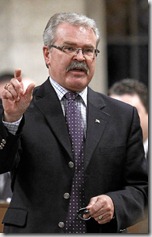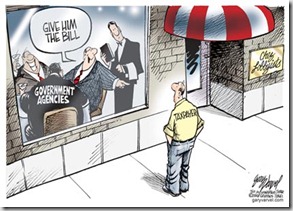It turns out that my previous post on government’s attitude towards the use of public funds was a perfect segue into this post.
 Gerry Ritz was on Power and Politics today defending his government’s action on the Canadian Wheat Board. Personally I have no opinion on whether dismantling the Board is a good idea or not. Logic would say an open market is better, but growing and selling wheat is not my business, so I don’t know. (Note however I do have an issue with the Harper government refusing to honour Section 47.1 of the Act that called for a farmers’ plebiscite before changing the Act, but that’s now a moot point as the Act has become law.)
Gerry Ritz was on Power and Politics today defending his government’s action on the Canadian Wheat Board. Personally I have no opinion on whether dismantling the Board is a good idea or not. Logic would say an open market is better, but growing and selling wheat is not my business, so I don’t know. (Note however I do have an issue with the Harper government refusing to honour Section 47.1 of the Act that called for a farmers’ plebiscite before changing the Act, but that’s now a moot point as the Act has become law.)
During the interview the host, Chris Hall, tried to get Gerry Ritz to tell him what the expected cost to taxpayers would be from dismantling the existing Canadian Wheat Board. Ritz bobbed, weaved, and obfuscated, never coming close to answering the question, because clearly he didn’t know.
But it was this particular exchange that really lit my fire:
CHRIS HALL: So you think though that you can handle these outstanding costs? (…) Ultimately you feel that this can be handled within the confines of the money that's available now?
GERRY RITZ: Well absolutely because the Treasury of Canada will be available for those extraordinary costs.
So, in a nutshell, the government has no idea what the costs will be of implementing this particular legislation, but it doesn’t really matter because “the Treasury of Canada” will be available. And in case it isn’t abundantly clear, that’s you and me, folks.
Kind of gives you that warm and fuzzy feeling that these guys are the best custodians of the public purse, doesn’t it?

